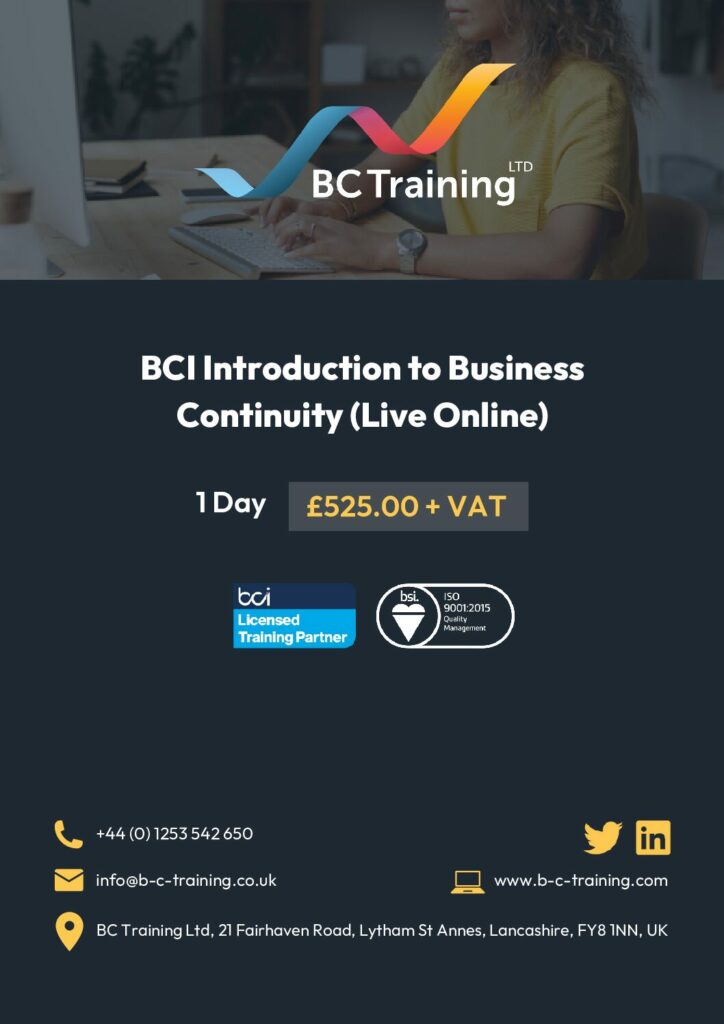BCI Introduction to Business Continuity (Live Online)

What’s included?
- Electronic course slides
- Electronic certificate of attendance
Details
Course Description
This course provides delegates with the basic knowledge and understanding of the building blocks required for developing or maintaining a business continuity management (BCM) programme.
This one day course comes complete with course slides and a workbook that contains exercises to be completed throughout the course. The course is based on the Good Practice Guidelines Edition 7.0 and reflects current International Standards in business continuity.
This BCI training course is delivered as a one day, live online training course by an approved BCI tutor. Scheduled breaks will be provided throughout the training. During the course, delegates will be able to use their microphones to take part in discussions and ask the tutor any questions, there is also the option to use a webcam too. Interactivity features used during the training may include the use of breakout sessions for group work, polls and quizzes. The course is delivered via GoToTraining.
Delegates will require a copy of the Good Practice Guidelines Edition 7.0. A free watermarked and non-printable electronic copy is included with the course. Hard copies are also available to purchase via our website. Pre-reading prior to attending the course is advisable.
The timings for this training are 9am-4pm UK time.
The cost of this course (ex VAT) is £525.00 / €625.00 / $700.00.
Course Modules
Module 1 - Introduction
This module aims to provide delegates with an understanding of the term business continuity, together with an introduction to the business continuity management system (BCMS).
By the end of this module, you will be able to:
- Define what is meant by the term business continuity.
- State the six elements that are the building blocks of the BCMS.
- Describe how the six elements are interwoven to deliver a BCMS.
Module 2 - Establishing a BCMS
This module explores the BCMS as described in the GPG Edition 7.0.
By the end of this module, you will be able to:
- Examine key activities needed to establish and maintain a BCMS.
- Explain how the scope of the BCMS should be defined.
- Describe the purpose of a business continuity policy.
- Understand the role and features of effective governance.
Module 3 - Embracing BC
This module looks at how to embrace business continuity into your organisation.
By the end of this module, you will be able to:
- Examine the importance and understanding of organisational culture.
- Establish the benefits and outcomes of embracing business continuity.
Module 4 - Analysis
This module describes how Analysis contains two techniques used for analysing the BC requirements.
By the end of this module, you will be able to:
- Describe the importance and role of the business impact analysis (BIA).
- Explain the different types of BIA and methods for undertaking a BIA.
- Examine risk assessment(s) in the context of the BCMS.
Module 5 - Solutions Design
This module explores how the Solutions Design identifies strategies, solutions and capabilities to mitigate unacceptable risks and single points of failure.
By the end of this module, you will be able to:
- Identify ways to determine solutions and strategies appropriate to the RTOs you identified in your BIA.
Module 6 - Enabling Solutions
This module looks at how to develop your incident response and business continuity plans.
By the end of this module, you will be able to:
- Explain how a response structure is established.
- Explain the characteristics of strategic, tactical and operational BC plans.
- Identify what makes an effective business continuity plan (BCP).
Module 7 - Validation
This module looks at how validation ensures the findings of the analysis are proportionately and reasonably reflected within BC Solutions Design and that the implemented solutions, in combination with the response structure and BC plans, work according to the agreed specifications and are commensurate with the size, complexity, and type of organisation.
By the end of this module, you will be able to:
- Examine the key elements of validation.
- Identify why we need to test our business continuity plan (BCP).
Module 8 - Bringing It All Together
This module covers a review of the course.
Upcoming Courses
Just looking for a price?
Request a quote below to have a member of the team come back to you with a price tailored to you.
Programme
09:00 - 09:15
Introduction
09:15 - 09:45
Module 1 - Introduction
- A Definition of Business Continuity - The Business Continuity Management System (BCMS) - Overview of PP1-6 - Glossary Terms09:45 - 10:30
Module 2 - Establishing a BCMS
- Defining the Scope of the BCMS - The Business Continuity Policy - BC Policy Outcomes - Establishing Governance - Roles and Responsibilities - Governance Outcomes10:30 - 10:45
Break
10:45 - 11:15
Module 3 - Embracing BC
- Understanding the Organisation's Culture - Cultural Attributes - Indicators of Embracing BC - Outcomes and Benefits of Embracing BC11:15 - 12:00
Module 4 - Analysis
- The BIA and RA - Product and Services BIA - Process BIA - Activity BIA - Impacts to Determine the MTPD and RTO - MTPD/RTO/MBCO - Working Through a BIA - Risk Assessment12:00 - 13:00
Lunch
13:00 - 13:45
Module 5 - Solutions Design
- Strategies to Resume Business Operations - Methods and Techniques - Resource Considerations to Resume Business Operations - Solutions Design and Selection Examples - Mitigating Unacceptable Risks and Single Points of Failure - Solutions Design13:45 - 14:30
Module 6 - Enabling Solutions
- Implementing BC Solutions - Designing the Response Structure - Response Agility - Team Responsibilities - Communications - Developing and Managing Plans - Plan Principles14:30 - 14:45
Break
14:45 - 15:30
Module 7 - Validation
- Developing an Exercise Programme - Types of Exercises - Developing an Exercise - Maintenance - Review15:30 - 15:45
Module 8 - Bringing it all together
- Question - Final task15:45 - 16:00
Course Review
Please note, timings are indicative and exact timings may vary due to delegate experience and their interest in certain topics. The course may finish earlier if all topics have been covered.
Course Benefits
By the end of the BCI Introduction to Business Continuity course, delegates will be able to:
- Explain the key elements of Establishing a Business Continuity Management System (BCMS).
- Examine the importance of organisational culture and the benefits of Embracing BC.
Describe the three types of business impact analysis (BIA) and risk assessment (RA). - Explain the purpose of business continuity Solutions Design.
- Examine key elements of Enabling Solutions and implement the principles of BC plans.
- Explain Validation by reviewing the exercising, maintenance and review phases.
Completing this course will contribute towards your BCI Continuing Professional Development (CPD). Further information can be found on the BCI’s website here.
Who Should Attend?
- Business continuity and resilience newcomers looking for a solid foundation to their learning in the subject of business continuity.
- Individuals with a full time or part time role or responsibility that requires an understanding of business continuity.
In-House Options
If you would like this BCI Introduction to Business Continuity training course delivered privately for your organisation, either live online or in person, please contact the BC Training team on 01253 542650 or email info@b-c-training.co.uk.
Testimonials
Sign-up to our Newsletter
"*" indicates required fields




